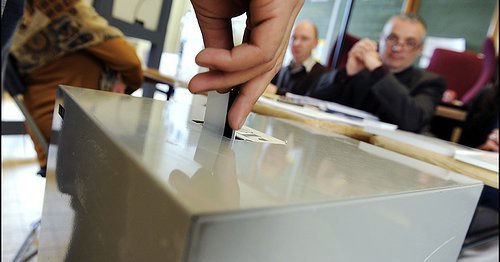As a result, it is the only way for the European people to influence with their votes the route of the European Union and also to express their positive or negative feelings about the policies and measures taken in important fields, such us the economic crisis, the immigration issue, unemployment, purchasing power, future of pensions and crime. Therefore, having in our minds that the current elections took place in the middle of a significant and difficult situation for the European Union, the results can provide us with very interesting information about the way European people voted, the big winners and losers and the turnout and abstention as well.
The turnout percentage in the current European Elections was 42,94%, 2,53% less than the one of the previous elections. Looking back in 1979, we can observe a reduction of about 16,5% in the participation in elections, going from a turnout of 61,99% to 45,47% in 2004 and to 42,94% today. There are good and bad news in that. Starting with the good news, we can argue that despite the so many problems, such us the huge anti - European campaign that took place before the elections in many countries, the current economic crisis and the immigration issue, despite also the fact that the elections were not national, the abstention was increased only by 2,53%.
Being honest with ourselves, our estimations have never showed that the turnout will be increased.
Being honest with ourselves, our estimations have never showed that the turnout will be increased. On the contrary, many argued that the turnout would be even lower than 40%. The result was somewhere in the middle of predictions. We can also find bad news, especially if we take some cases of countries with a really low turnout, such us Slovakia with only 19,64%, Lithuania with only 20,91% and Poland with 24,53%. Big turnouts found in Luxembourg (91%), Belgium (90,39%) and Malta (78,81).
Every election has big winners and losers; we had them in the 7th of June as well. European’s People Party and European Democrats kept the first place in the Parliament, without having big loses. The best way to compare the position of the parties with their position in the outgoing Parliament is to take into our account not the difference between the seats but the difference in percentages, having in mind the reduction of the seats from 788 to 736. Therefore, EPP/ED kept its power by gaining 35,7% (-1%) and 263 seats. Big winners were the ruling centre-rightwing party in France, the rightwing People’s Party in Spain and the Christian Democratic Union in Germany. Checking the results in separate countries and the seats it gained in the new Parliament, the Socialist Group (PES) is one of the big losers, having a reduction of 5,7% (188 seats in 2004, 161 now). Big losers were the Social Democratic Party of Germany (SPD), the governing Socialist Party in Spain (PSOE) and the governing British Labour Party. The third until now power in the Parliament, the Group of the Alliance of Liberals and Democrats for Europe (ALDE) had a slight reduction of 1,8%, while Greens had an increase of 1,6%, with the new-established Green Parties in France and Greece gaining for the first time seats in the European Parliament. The three other parties, the Union for Europe of the Nations (UEN), the Confederal Group of the European United Left / Nordic Green Left (GUE/NGL) and the Independence / Democracy Group (IND/DEM) had slight and not important reductions as well. Finally, we had an increase of 8,8% in the category of “others”, which is mostly consisted of EP’s from United Kingdom (Conservatives), Italy (Partito Democratico) and Czech Republic (ODS – Liberal Conservatives).
The crucial bet starts now. The new European Parliament and the European Union generally as a whole have to prove to the European citizens that they don’t consist a Union of another continent. They have to prove that European Union is here for the European citizens with the aim to defend their rights in the crucial issues of economic crisis, unemployment, immigration and many other issues. Either Christian Democrats or Socialists or Greens or Liberal Democrats, the parties that will consist the European Parliament for the next five years should agree and fight for something common: a European Union that respects and defend the European citizens and promote solutions in the real problems of the society, being next to them and not only in Brussels –far away from them-. They have in their hands five years to overcome all these problems that exist today and especially to reach an agreement over the Lisbon Treaty -or any other plan under a common agreement-, which will improve the internal structure and function of the Union. Only then, we will see a real interest of the people for the European Elections and maybe -who knows- an increasing participation for the first time in the history after 1979. Time will show.

Follow the comments: |
|
